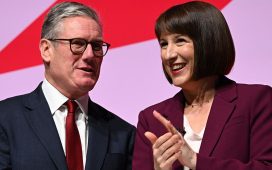
While the vote is not binding, it puts more pressure on Prime Minister Keir Starmer who has faced huge amounts of opposition over the controversial policy to take away the benefit from millions of pensioners by making the normally guaranteed payment means-tested.
Sharon Graham, the general secretary of Unite moved the proposal.
She said: “The nation wants food, work and homes… It wants a high and rising standard of living, security for all, against a rainy day…”
“Friends, that’s a quote from the 1945 Labour Manifesto, written in the shadow of death, destruction and debt, caused by years of war. A manifesto of hope.”
Ms Graham said debt then was “nearly three times higher than it is now” but there was “no mention of cuts, no mention of austerity and certainly no mention of making everyday people pay”.
She added: “I do not understand how our new Labour government can cut the winter fuel allowance for pensioners and leave the super-rich untouched.
“This is not what people voted for. It is the wrong decision and needs to be reversed.”
The motion was passed by a show of hands.
The recent proposed cuts, which would remove some people’s eligibility for the winter fuel payment this winter, would potentially affect about 10 million pensioners in the UK.
Senior Labour politicians have maintained that means testing the benefit is necessary to help fill a funding black hole left behind by the Tories. Reports suggest this will save the country around £1.3 billion.
Under the plans the country’s most vulnerable pensioners will still receive the credit, worth up to £300.
Here’s what you need to know about the winter fuel payment.
What is the winter fuel payment?
It is a tax-free annual payment the Government provides to help older people with their heating costs during the winter. At present, the payments are a universal benefit for all pensioners.
Who is eligible for winter fuel payment?
The amount pensioners receive depends on their age and living situation. For example:
From 2024, only pensioners receiving other benefits such as universal credit or pension credit will qualify for the winter fuel payment.
Many have argued that pensioners only receive pension credit if their annual income is below £11,336.
Caroline Abrahams, charity director at Age UK, said restricting the winter fuel payment to those on pension credit was “reckless and wrong” and “spells disaster for pensioners on low and modest incomes”.
Age UK said it would fight the decision and has launched a petition.
Scotland no longer provides the universal winter fuel payment for all pensioners. Instead, the Scottish government has introduced the winter heating payment, an annual allowance of £58.75 for those receiving certain benefits.
When will eligible people receive their winter fuel payment?
Those eligible will get a letter telling them:
- how much they’ll get
- the bank account it will be paid into – usually the same one as for pension credit or other benefits.
How to apply if you think you are eligible for the winter fuel payment
If you think you are eligible for the winter fuel payment but haven’t received it automatically, you can apply by following these steps.
- Check eligibility: Ensure you meet the eligibility criteria mentioned above.
- Gather information: Have your national insurance number, bank or building society details, and the date you were married or entered into a civil partnership (if applicable) ready.
- Apply by phone or post: By phone: Call the Winter Fuel Payment Centre. The phone number can be found on the UK Government website. By post: Download the claim form from the UK government website, fill it out, and send it to the address provided on the form.
- Submit your claim: Make sure to submit your claim by the deadline, usually around the end of March for that winter season.
When was the winter fuel allowance introduced?
The Labour government of Tony Blair introduced the payment in 1997 to tackle fuel poverty among older people. The goal was to provide financial support to help pensioners with the costs of heating their homes during the cold winter months.
The payment was £20 (or £50 for those in receipt of means-tested benefits).











